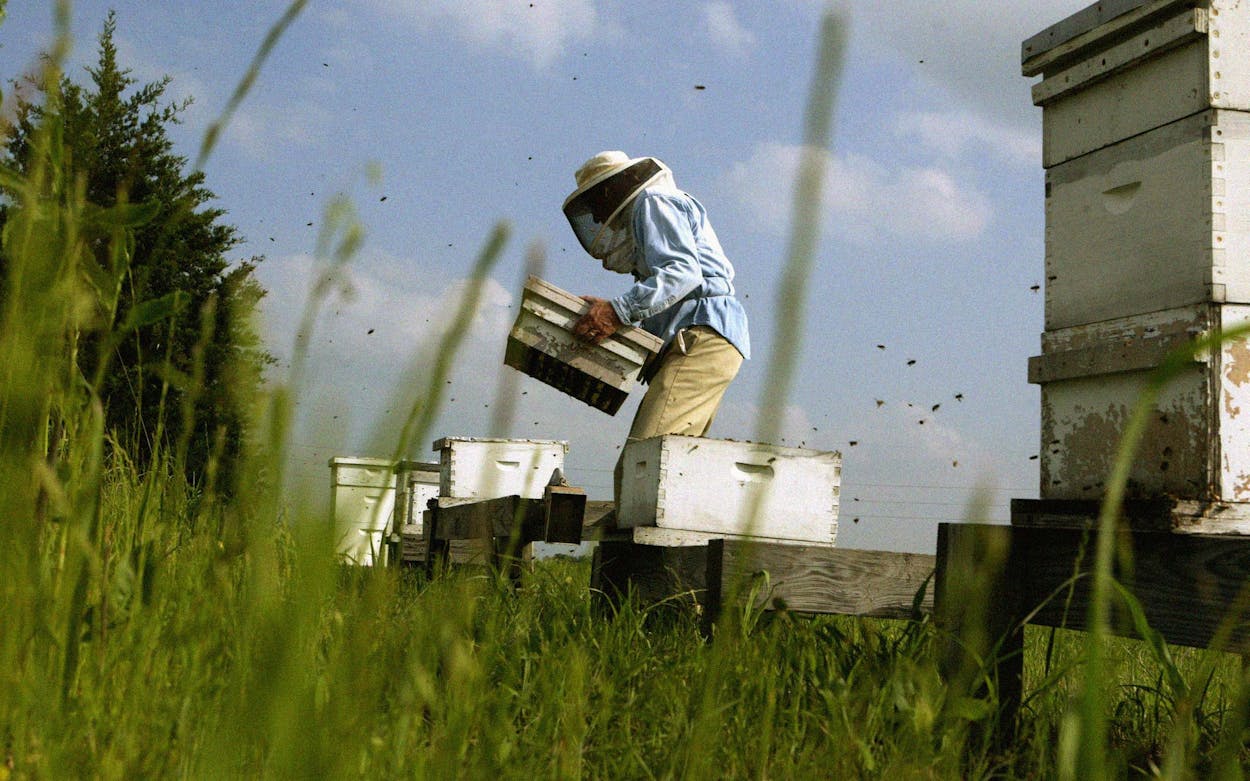Wes and Dede Price run a small honey operation out of their Allen backyard. They started Bare Naked Bee Company about a decade ago with a couple of queen bees, and today they’ve got a hundred hives, each humming with 50,000 to 60,000 bees. They jar about 2,500 pounds of Texas wildflower honey annually to sell at farmers markets and retailers. Because their operation is 100 percent Texan, they won’t face penalties if House Bill 590 passes.
The bill, authored by Texas representative Ernest Bailes, who represents District 18, in the southeastern part of the state, proposes that products labeled as “Texas honey” must consist “exclusively” of honey produced from Texas apiaries. If codified, the bill would become part of chapter 131 of the Texas Agriculture Code, indicating that beekeepers could be hit with a class B misdemeanor if their honey contains any traces of out-of-state pollen or is blended with honey from outside Texas.
While that sounds like perfectly logical legislation, the complexities of the honey and beekeeping business make it a bit fuzzy.
Just ask Blake Shook, who runs Desert Creek Honey out of Blue Ridge, northeast of Dallas. He started raising hives at just twelve years old, and now his company taps honey from its 30,000 hives. Because heat is brutal to bees, when it gets to be summertime, he ships his bees to central California, where they pollinate almond trees.
If HB 590 passes, Shook would no longer be able to label his product as “Texas honey,” since his bees summer in California.
“The intention behind it is awesome,” Shook says of the bill. “We do have a problem with mislabeling. My beef with it is that we’re still using the word ‘exclusive.’ ”
The past decade’s gut-punch climate combo of extreme rain and drought has contributed to an increased percentage of colony losses over much of the past decade. So, sometimes, Texas beekeepers lend their bees to other states so they can effectively pollinate and continue to help provide staples like almonds and apples (which don’t grow well in Texas) to the American public.
If beekeepers are deterred from sending their bees outside state lines, we might see a lot less delicious produce in our grocery stores.
Dodie Stillman, the Texas Beekeepers Association (TBA) president, left her corporate gig years ago to be a full-time beekeeper, and she sells honey now and then to friends. Even though her products aren’t on the market, she has issues with the wording of the bill too.
“We are absolutely in favor of truth in labeling,” she says. “But if you are a beekeeper that lives on the border with another state, or if you take your bees to California for pollination . . . you can’t sell honey as ‘Texas honey.’ ”
She brings up a practical point that beekeeping expert and University of Texas at Dallas professor Scott Rippel agrees with: bees don’t observe state borders.
“I would make an argument that the word [‘exclusively’] should be replaced with ‘predominantly,’ ” he says. “It’s not as easy as stamping ‘Made in America’ on it.”
There is serious money on the table. About 6.6 percent of the country’s honey supply is from Texas, according to the latest National Agricultural Statistics Service honey report. That translates to 8.3 million pounds of the beloved condiment, valued at $27.4 million.
Bailes says the bill is intended to discourage companies blending Texas honey with honey from bees in apiaries housed outside the state. “A majority of the Texas honey labeled as ‘Texas honey’ is not from Texas,” Bailes claims, adding that misinformation about the bill will likely lead to its failure. HB 590 has been referred to the Senate Committee on Water, Agriculture, & Rural Affairs, and it’ll likely die there if a hearing isn’t scheduled.
“The word ‘majority’ is a pretty loose term—a lot of honey at retail locations is likely a blend of honeys,” TBA secretary Leesa Hyder says. “After talking with beekeepers about this bill, I believe that ‘Texas honey’ labeled as such is predominantly Texas honey.” Bailes insists that “it’s a good, red-blooded Texas bill” and that HB 590 is not designed to punish honey operations like Shook’s.
The Texas Beekeepers Association has chosen to remain neutral on the bill, but it still has some questions on how the legislation would be put into practice. “How are they going to confirm it’s Texas honey?” Stillman asks. “We don’t have a fast, cheap test.”
While local beekeepers say HB 590 is a good start, there are other related concerns they’d like brought up too.
“I would think a bill that addresses the one hundred percent pure honey, with no syrup additives, would be more useful,” Dede Price says.
No matter the label, beekeepers like the Prices are focused on raising awareness around colony loss and the vital importance of bees. The couple takes time in between honey harvests to deliver seminars on beekeeping (as does Blake Shook), encouraging the relationship between native wildflowers and bees, which is what really defines “Texas honey.”
“Go grab a bottle of honey in that generic bear at the store,” Wes Price says. “There’s a world of difference.”
- More About:
- Politics & Policy
- Business
- Texas Lege
- Austin
- Allen






